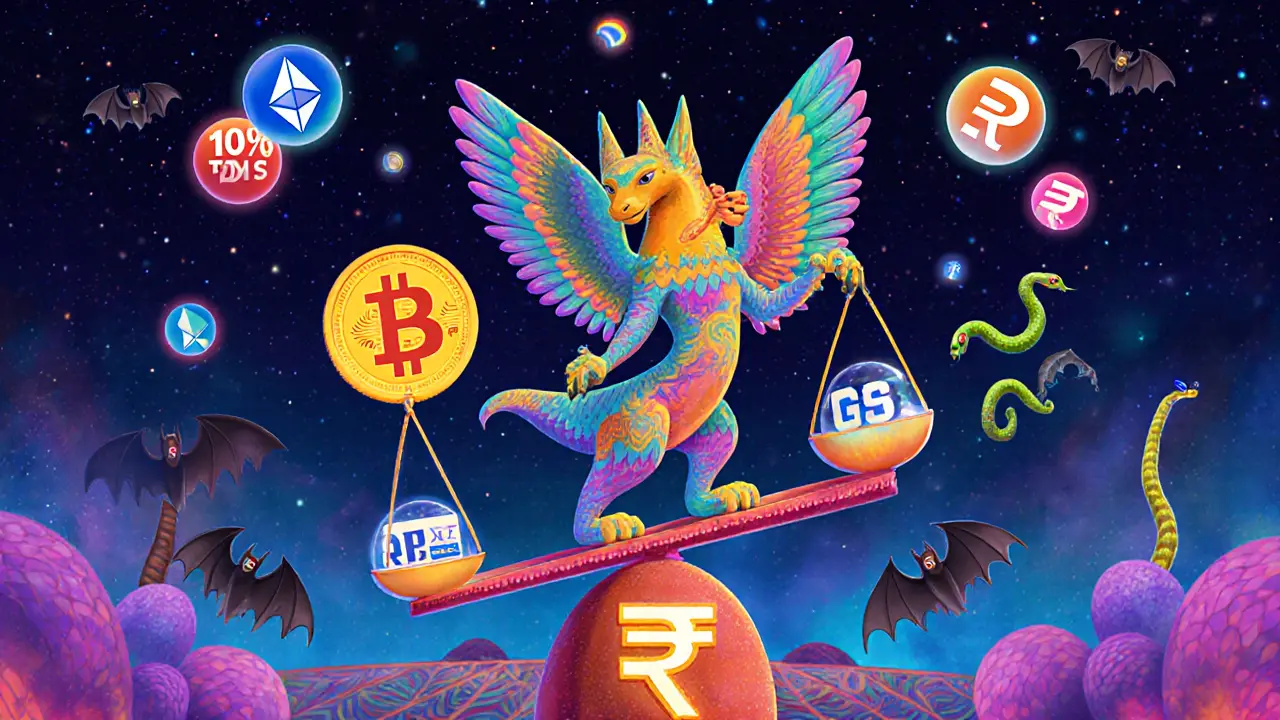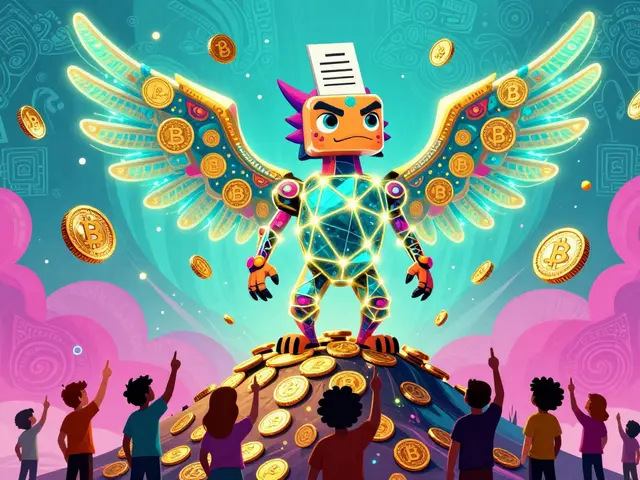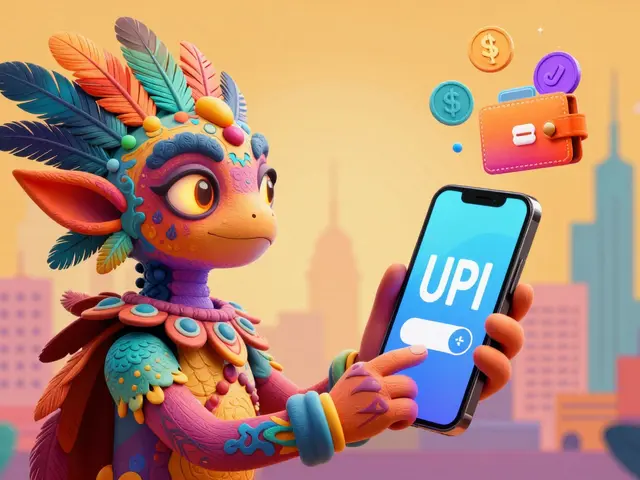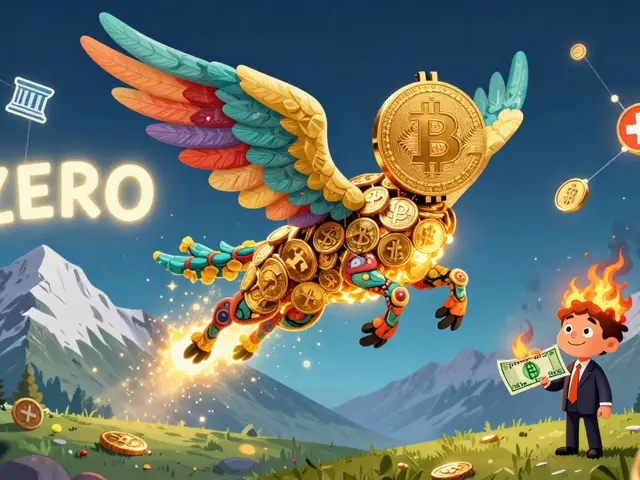Crypto Tax Calculator for India
30% tax on crypto gains with 4% cess (total 31.2%)
1% TDS on transactions over ₹10,000
18% GST on all exchange fees
No loss carryforwards allowed in India
If you're trading Bitcoin, Ethereum, or NFTs in India, you're paying crypto tax-and it’s not what most people expect. Unlike countries that treat crypto like stocks, India slapped on a 30% flat tax on every profit, added a 1% tax at the source, and now even charges GST on exchange fees. There’s no holding period discount. No deductions for fees. No indexation. Just a blunt, high tax bill on every trade that makes money.
How India Taxes Crypto: The 30% Rule
Since April 1, 2022, all cryptocurrency transactions in India fall under Virtual Digital Assets (VDAs). The government doesn’t care if you held Bitcoin for a week or five years. Profit? You pay 30%. That’s it. No sliding scale like in the U.S., where long-term gains can be taxed as low as 0%. In India, 30% is the floor-and it’s not even the full picture.
On top of that 30%, you add the 4% health and education cess. That brings your real tax rate to 31.2%. If you bought Ethereum for ₹50,000 and sold it for ₹80,000, your profit is ₹30,000. You owe ₹9,360 in taxes. That’s almost a third of your gain gone before you even touch the rest.
And here’s the kicker: you can’t deduct anything except the original purchase price. No exchange fees. No gas fees. No wallet costs. Not even the cost of buying the crypto with a credit card that charged you a 2% fee. Only the price you paid. That’s it.
The 1% TDS That’s Eating Into Your Trades
On July 1, 2022, India added another layer: 1% TDS (Tax Deducted at Source) on every crypto transaction over ₹10,000. For high-value users (like those with over ₹50,000 in annual transactions), the threshold is lower. This means every time you sell, swap, or even gift crypto above that limit, the exchange withholds 1% and sends it straight to the government.
Let’s say you sell ₹1,00,000 worth of Solana. ₹1,000 gets taken out before you even see your money. You think you’ll get it back when you file taxes? Maybe. But TDS credits are messy. Many users report mismatches between what exchanges report and what shows up in their AIS (Annual Information Statement). In 2023-24, over 32% of taxpayers had trouble claiming TDS credits because of data gaps.
And here’s the real problem: TDS applies even if you’re breaking even or losing money. If you bought Bitcoin for ₹80,000 and sold it for ₹75,000, you still pay ₹750 in TDS. No refund. No offset. Just money gone.
GST on Exchange Fees: The Hidden Cost
As of July 7, 2025, everything you pay to an exchange is now taxed at 18% GST. That includes trading fees, withdrawal charges, staking rewards processing, and even deposit fees. This isn’t just for big platforms. Even small Indian exchanges must register for GST, regardless of how much they earn. Normally, businesses only need GST if they hit ₹20 lakh in revenue. Crypto platforms? They have to register no matter what.
For users, this means your ₹50 trading fee now costs ₹59. Your ₹100 withdrawal fee becomes ₹118. It adds up fast. CryptoWire’s July 2025 report estimates this change will raise operational costs for exchanges by 15-20%, and those costs are being passed to retail traders. If you’re active, you’re paying more just to move your assets.

What Counts as a Taxable Event?
Not every crypto action is taxed the same. Here’s what triggers a tax bill:
- Selling crypto for INR → Taxable gain
- Trading one crypto for another → Taxable (even if you didn’t cash out)
- Receiving crypto as payment for goods/services → Taxable as income at fair market value
- Staking rewards or mining rewards → Taxed as income when received, at market value
- Airdrops → Taxed as income when you take control of them
- Gifts of crypto → Taxed at fair market value when received (unless from close family)
- Buying crypto with INR → Not taxable
- Transferring crypto between your own wallets → Not taxable
That last one trips up a lot of people. Moving crypto from Binance to Trust Wallet? No tax. Selling that same crypto? Taxed. The moment you convert to fiat or trade for another asset, the clock starts ticking.
What’s Not Covered?
The government made it clear: gift cards, vouchers, loyalty points, and non-fungible tokens tied to real-world assets (like concert tickets) are not VDAs. Only digital assets with blockchain-based ownership records count. That means NFTs of digital art, collectibles, and metaverse land? Taxed. NFTs for event access? Not taxed.
Also, crypto received as a gift from family members (spouse, children, parents, siblings) is exempt from tax at receipt. But if you later sell it, the original purchase price becomes your cost basis. If your dad bought Bitcoin for ₹1 lakh and gifted it to you, and you sell it for ₹4 lakh, your gain is ₹3 lakh-not ₹4 lakh.
Why This System Is Controversial
India’s approach is extreme compared to most countries. The U.S. taxes crypto gains at 0-20% if held over a year. Portugal taxes zero for non-professionals. Even Singapore doesn’t tax capital gains at all. India’s 30% flat rate is among the highest in the world.
Experts like Dr. Indranil Bhattacharya from IIM Ahmedabad argue the system penalizes investment. With inflation hovering around 5-6%, a 31.2% tax on gains means you’re often losing money in real terms. If your crypto only went up 4% in a year, you still owe over 30% of that gain. That’s a negative return after tax.
Industry groups like the Blockchain and Crypto Assets Council (BACC) say the dual tax (30% + TDS) is a deterrent to innovation. Retail trading volume dropped 47% in the first six months after the tax hit. The user base shifted from 82% retail to just 57% retail by 2024. Most active traders now are institutions who can afford the compliance cost.

How to Track Your Taxes
Doing this manually? It’s a nightmare. You need:
- Full transaction history (buy, sell, swap, stake, airdrop)
- Exact timestamps
- INR value at time of each transaction
- Wallet addresses for every transfer
Most people use software now. Tools like KoinX, CoinTracker, and CryptoTaxCalculator India sync with exchanges and wallets. They auto-calculate gains, flag TDS credits, and generate reports for ITR filing. The average user used to spend 8-12 hours per quarter. Now it’s 2-3 hours.
But even software can’t fix bad data. If your exchange didn’t report a transaction to the government, or if you used a decentralized wallet, your AIS might be incomplete. You’re still responsible for reporting it. Keep your own records. Screenshots, CSV exports, spreadsheets-everything.
What’s Coming Next?
The Joint Committee on Virtual Digital Assets, formed in November 2024, is expected to release recommendations by March 2026. Early signals suggest they might:
- Adjust the TDS threshold for small traders
- Clarify tax treatment for DeFi protocols (like Uniswap or Aave)
- Address cross-border crypto transfers
- Consider a distinction between short-term and long-term holdings
But don’t expect major relief. The government’s position hasn’t changed: “We don’t encourage or discourage. We only tax it.” Finance Minister Piyush Goyal made that clear in 2023. The real goal? To make crypto expensive enough that people switch to the e-Rupee, India’s central bank digital currency.
The e-Rupee is already live in pilot mode. It’s backed by the RBI. No volatility. No tax on gains. And it integrates with banks. That’s the endgame.
What Should You Do?
If you’re trading crypto in India:
- Use tax software. Don’t guess.
- Save every transaction record. Even if you think it’s “just a swap.”
- Check your AIS on the income tax portal. Match it with your exchange statements.
- Don’t ignore TDS. Claim it in your ITR, even if it’s messy.
- Consider holding longer. Even though there’s no long-term discount, holding reduces trading frequency-and thus, TDS hits.
- Be ready for more fees. GST on exchange services is here to stay.
It’s not a friendly system. But it’s clear. And clarity, even when harsh, beats uncertainty. After 2022, everyone knew the rules. Now you just have to play by them.
Is crypto legal in India?
Yes, crypto is legal in India. The Supreme Court lifted the RBI’s banking ban in 2020. You can buy, sell, and hold crypto. But it’s heavily taxed. The government doesn’t ban it-it taxes it. That’s the official stance.
Do I pay tax if I lose money on crypto?
You don’t pay tax on losses, but you also can’t offset them against other gains. If you lose ₹50,000 on Ethereum and make ₹80,000 on Bitcoin, you still pay 30% tax on the ₹80,000. Losses are ignored. No carryforward. No deduction. That’s unique to India’s crypto tax rules.
What happens if I don’t report my crypto gains?
The Income Tax Department now receives transaction data directly from exchanges via AIS. If you don’t report, you’ll get a notice. Penalties can be up to 200% of the tax evaded. In 2023-24, over 12,000 notices were issued for unreported crypto income. It’s not worth the risk.
Do I pay tax on crypto received as a gift?
Yes-if it’s from someone outside your immediate family (spouse, children, parents, siblings, grandparents). If you get crypto from a friend or uncle, it’s taxed as income at its market value when you receive it. If it’s from your mom, no tax at receipt. But if you sell it later, you pay 30% on the gain from the original purchase price.
Are NFTs taxed the same as Bitcoin?
Yes. All NFTs are classified as Virtual Digital Assets. Whether it’s a digital artwork, a virtual land plot, or a collectible avatar, selling it for profit triggers the 30% tax. Buying an NFT with crypto? That’s a taxable event too-you’re trading one VDA for another.
Can I use foreign exchanges to avoid Indian taxes?
No. Indian tax law applies to all residents, regardless of where they trade. If you’re an Indian resident, you owe tax on global crypto gains. The government gets data from exchanges that report to Indian regulators. Even if you use Binance or Kraken, your transactions are tracked through KYC and AIS. Avoiding tax this way is illegal.
What about crypto mining in India?
Mining rewards are taxed as income at the fair market value when you receive them. If you mine 0.1 BTC and it’s worth ₹5 lakh on the day you get it, you owe tax on ₹5 lakh as income. You can’t deduct electricity or hardware costs. The 30% rule applies when you later sell it.
Is there any way to reduce my crypto tax bill?
Not much. The rules are strict. Your best options: minimize trades to reduce TDS hits, hold longer to avoid frequent taxable events, and use tax software to avoid errors that trigger notices. Don’t try to hide transactions. The system is designed to catch them.
The crypto tax system in India isn’t built to help you grow wealth. It’s built to manage risk, collect revenue, and steer people toward the e-Rupee. If you’re in it, you need to play by the rules-because the government is watching.












11 Comments
India’s crypto tax system is a nightmare for retail traders. I’ve been trading since 2021 and the 30% tax plus 1% TDS eats up half my profits before I even see them. And don’t get me started on GST on withdrawal fees - I’m paying more in fees than I made on some trades last month. No deductions, no loss carryforwards, no mercy. It’s not taxation, it’s extortion.
So let me get this straight - if I buy Bitcoin at $50k and sell at $49k, I still pay $100 in TDS? And I can’t even use that loss to offset gains elsewhere? This isn’t a tax policy, it’s a punishment for people who dare to think outside the RBI’s little box. The government doesn’t want crypto to succeed - it wants it to hurt.
It’s ironic. The government claims they’re bringing transparency, but the system is so convoluted that even tax professionals struggle. I’ve spent more time filing crypto taxes than I have trading. And the AIS mismatches? Pure chaos. They’re not helping - they’re just adding bureaucracy.
30% tax on crypto? Wow. Next they’ll tax oxygen and sunlight. At this point, I’m just glad I didn’t buy any NFTs of my cat. That’d be a triple tax: purchase, holding, and emotional attachment.
Don’t let this scare you. Yeah, the rules are harsh but they’re clear. Use KoinX. Save every screenshot. Hold longer. Trade less. You’ll still win if you play smart. Crypto isn’t going away - the government just wants its cut. Get organized and keep going.
They’re using crypto taxes to push the e-Rupee and they’re not even hiding it. This isn’t about revenue - it’s control. The AIS data? They’re building a digital surveillance state. Your every trade is logged. Your wallet is tracked. They want you dependent on their currency. Don’t fall for it
What’s the purpose of wealth if the state takes 31.2% of every gain and denies you the right to offset losses? We’re treating financial activity like a crime. If you profit, you’re guilty. If you lose, you’re invisible. This isn’t economics - it’s moral judgment dressed in tax code.
I’ve been using CoinTracker for over a year now and it’s saved me from multiple notices. The key is consistency - log everything, even small swaps. The system’s flawed, but it’s predictable. If you treat it like accounting and not gambling, you’ll be fine. Also, check your AIS every quarter. It’s not optional.
just wanna say to anyone stressed about this - you’re not alone. i’ve been there. the tds thing made me wanna quit. but i started using crypto tax calculator and it made everything less scary. hold on, stay organized, and remember - this too shall pass. we’ll get better rules someday
While the Indian government’s approach appears draconian, it is not without precedent in jurisdictions seeking to regulate nascent financial technologies. The imposition of TDS and GST, though burdensome, does provide a transparent audit trail. One might argue that clarity, even when unpalatable, fosters institutional adoption over time. The e-Rupee initiative, while politically motivated, may yet serve as a stabilising force in a volatile ecosystem.
Hey everyone - if you’re feeling overwhelmed, you’re not broken. The system’s designed to be confusing. I used to panic every time I had to file. Now I just set a reminder every month to export my trades. Even if you only do 10 minutes a week, you’ll be ahead of 90% of people. And hey - if you need help, DM me. I’ve been there. You got this.